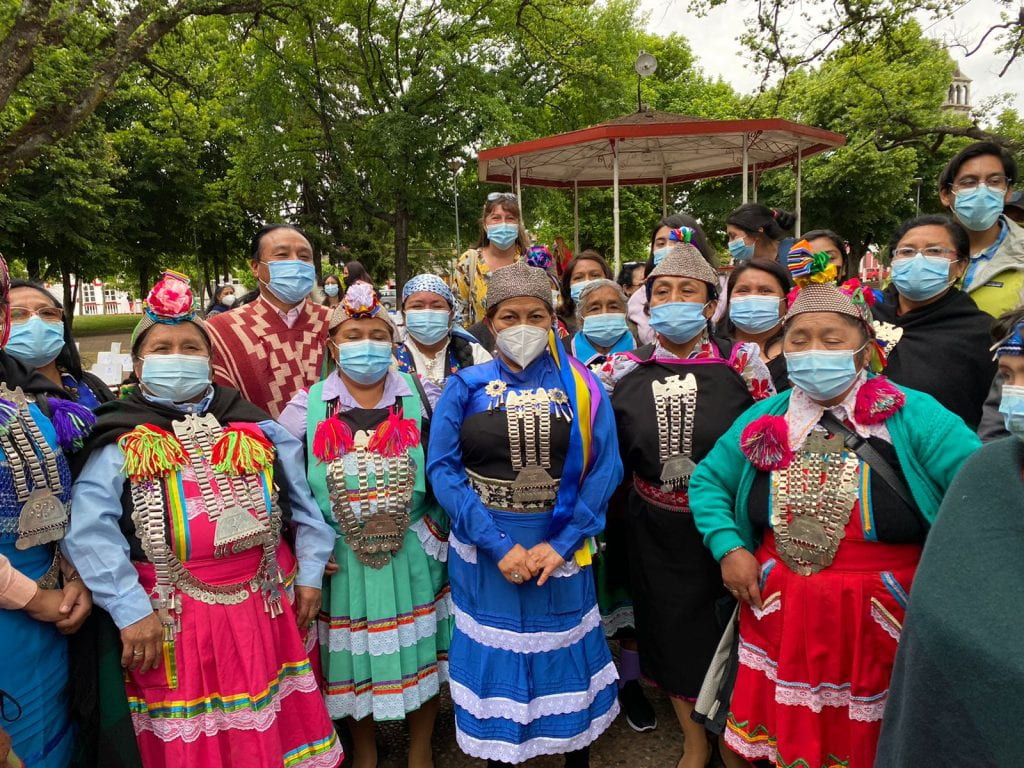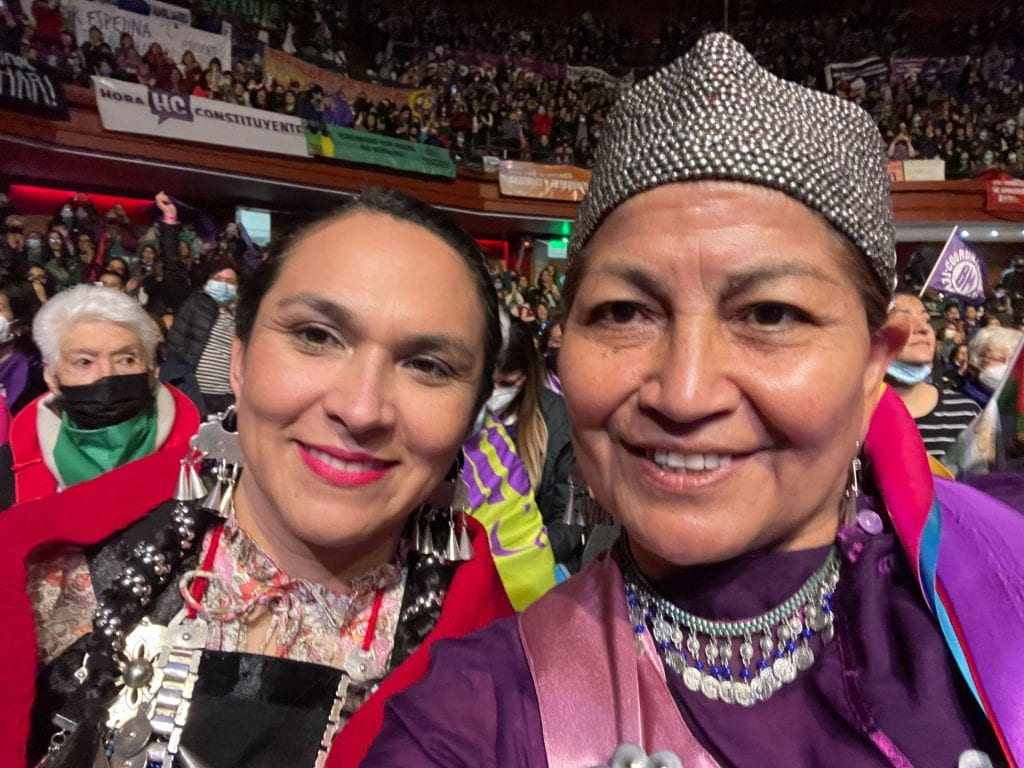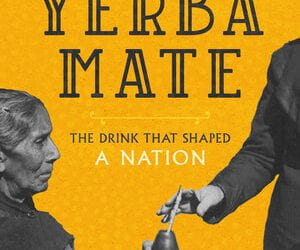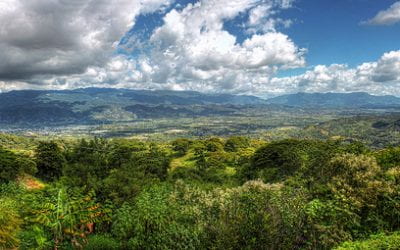The Mapuche Struggle for the Recognition of its Nation
From a Feminine and Decolonizing Point of View
As President of Chile’s recent Constitutional Convention, I and my fellow delegates aimed to present an inclusive, democratic constituent process written by the Chilean people, and defining Chile as a social and democratic state of law: plurinational, intercultural, regional and ecological. The constitution would replace the one drawn up in 1980 by the dictatorship of General Augusto Pinochet, but it was rejected in the September 4, 2022 referendum. Chileans rejected the proposed constitution for various reasons, including misinformation, in which hate speech and lies against indigenous, feminist and social demands played an important role. The 1980 constitution continues in effect for now, marked by the neoliberal ideology, which does not protect social rights, nor does it recognize or respect the rights of indigenous peoples.
Chile is a country inhabited by a diversity of aboriginal peoples and nations, but their existence has been systematically denied by internal colonialism from the Chilean State. I am Mapuche, and we are educated in two educational systems, the traditional Mapuche system itself and the Chilean school. This condition has allowed me to focus from an intercultural perspective on defending the rights of Indigenous peoples, mainly the right to language and intercultural education because. I believe that Indigenous peoples can continue to be Indigenous peoples with our languages, philosophy, exercising our rights and being part of a plural society, exercising autonomy, living in our territories.
I’d like to examine the Chilean constitutional process to express what we do, why people rejected the proposal and what we learned from it, from a Mapuche woman’s point of view.

Elisa Loncón with Mujeres Naqche de Traiguen (the Naqche Women of Traiguen), in November 2021 when that municipality declared her an Illustrious Daughter
Mapuche and other Aboriginal Nations.
The Mapuche people are an aboriginal nation like nine other nations. We are approximately 10% of the Chilean population, about two million people in total. Historically, the Mapuche resisted Spanish conquest for three centuries. Our territory was finally occupied by the Chilean state through military occupation 142 years ago.
The Spanish conquest implied the genocide of our peoples as well as the imposition of an anthropocentric philosophy, a patriarchal culture and the Eurocentric hierarchies with which people were historically treated as inferiors and denied their human condition.After the conquest, the relationship of the Chilean state with our people has not been different from that of the Spanish conquerors, because it continued with territorial dispossession, a process in which we lost 95% of our original territory, and which resulted in economic, cultural and linguistic poverty, and the loss of autonomy and self-determination from which we still have not recovered.
Eurocentric thought in the Chilean modern society installed the idea of progress, but it has destroyed our cultures and plundered the common goods of nature. They called indigenous peoples primitive, without God, barbarians, as a strategy to justify genocide. However, the Mapuche people, despite everything, have preserved part of their own culture, the Azmapu, the philosophy of good life, which speaks of caring for the “lof” or community and protecting people and nature, this has contributed to maintaining the condition of Aboriginal nation, knowledge, values and language. The Mapuche philosophy seeks the good life, maintaining the indissoluble link between people and nature, it recognizes the earth as mother, respects the life of all beings such as the mountains, rivers, hills and birds. We also understand that human beings find ourselves in this world to take care of each other and to take care of the earth. The Mapuche people respect the word, and throughout history we have developed good diplomatic relations with other peoples. The Mapuche traditional organization still exists, its system of decision-making is horizontal, and both men and women participate in it. This system made it possible to face the Spanish conquest, prevented the destruction of the social Mapuche system of the communalities and the maintenance of the traditional role of men and women. The Chilean political system and the political constitution does not recognize this social system nor the Indigenous people.
Mapuche Woman and Azmapu Philosophy.
The Mapuche woman comes from a culture centered on the earth, the Azmapu philosophy, the philosophy of good living, which recognizes the feminine power of the earth through stories, songs and ceremonies. This value is taught. We learn that on earth there are female spirits who give spiritual strength and wisdom to women, also the earth and the universe was created by a woman. The philosophy of the Azmapu can be recognized on the continent and in the world as a “philosophy of the south” (Dussel, 2015) like an “ontology” of the native peoples (Escobar, 2014; Dávalos, 2014) and an epistemology “epistemology of the south” (Santos, 2013).
The Azmapu philosophy recognizes the aboriginal ontology, and it speaks about the existence of diverse entities, beings and forms of human and non-human life, that are different from the Eurocentric Western culture. Today it is called ontologies of the aboriginal Peoples (Escobar, 2014; Dávalos 2014), Ontology of resistance, political ontology.
Patriarchy was acquired through cultural colonialism, but the resistance of women has allowed their participation in politics, in social organizations, and they have been part of the Aboriginal authorities. In the context of economic impoverishment, women pass down traditional knowledge, language, culture and have provided solutions based on that knowledge.
The Mapuche people have prepared their entire lives to participate in the common destiny of Chile, because we belong to Chile, were here first, and we believe in plurinationality as a political system where people can share their world view, but with human rights. In 2021 we experienced a first opportunity to reach the objective of being plural nations when I, a Mapuche woman, was elected as president of the constitutional Convention, to write the first parity constitution that defined a coexistence of nations, parity, democratic with social and plural justice. With this process, the roots of Chile were displayed to seek a common destiny, as well as the diversity of peoples and cultures, the different stories of women, who had never been heard from before in state bodies.
As president of the Convention, I made the board of directors a plural one with the inclusion of all the political forces present, from the right to the left, including independent movements; the presidency and vice-presidency were rotated. This process was completed after six months.
Elisa Loncón with former Constitutional Convention delegate Rosa Catrileo, in the Caupolicanaso Feminista August 25, 2022.
Mapuche female leadership gave a new face to Chilean politics and awakened people’s hopes, using aboriginal languages and aboriginal dress, women and regions, previously unheard diverse groups, to achieve the exercise of their respective rights. It was a concrete example that it is possible to expand democracy and exercise another way of governing with women, regions, gender, gender diversities, peoples and social movements.
The Proposal for a New Constitution Rejected.
The Constitutional Convention was installed by the government to put an end to the 2019 social outbreak that had mobilized all Chileans against 30 years of neoliberalism, the denial of social rights, the privatization of water and its prioritization of industrial use over human use. The government called for a referendum to consult citizens about changing Pinochet’s constitution. In the 2020 referendum, Chileans voted 78 percent in favor of rewriting the constitution after months of protests.
Subsequently, 155 conventions were chosen democratically to write the constitution in 2021, creating a constitutional convention with gender equity incorporation of 9 out of 10 Indigenous nations, represented with a total of 17 conventional constituents, elected by reserved seats.The proposal for a new constitution enshrined the rights of nature and the special duty of the State to guard the common goods of nature, the protection of glaciers and wetlands, animals and mountains; in addition to guaranteeing the universal right for health and water and sanitation, declaring water as a common good that cannot be privatized in any of its states. It also enshrined social rights, parity rights and the rights of indigenous peoples, among others such as a new political system, an asymmetric congress that would give the power to regions and replace the current Senate with a Chamber of Regions with more defined responsibilities.
Methodology
All political sectors were in minorities, no one had the power of veto, so we were obliged to reach agreements. The agreements had to be reached with a two-thirds vote in plenary.For the process of writing the constitutional norms, we use a participatory methodology, the Convention called to the citizens and specialists to participate in public hearing to give background and propose norms on multiple constitutional matters: migration, social rights, the media, rights of nature, forms of states and other topics. We made a call to the citizens to present popular initiatives to include them in constitutional norms, and we also held an Indigenous consultation. Nevertheless, one sector never wanted to participate in the larger agreements, the liberal and conservative right parties, a sector from which the rejection was developed from the beginning, specifically, Chile Vamos, Evópoli and the Independent Democratic Union (UDI) parties.
The Results of the New Constitution
The new constitution would have recognized the rights of Indigenous peoples for the first time, added environmental protections, gender parity and guarantees of the rights for education and health care. Indigenous rights, together with ecological rights and feminist demands, occupied a prominent place in the new Constitutional proposal.
The rejection of the proposal was made with a campaign of misinformation and terror that installed fear in the population against plurinationality, women rights and social rights. The opposition began a terror campaign inside the Convention against the Mapuche, feminists and leftist ecologist delegates. The hate campaign was led by members of the right-wing parties, through Twitter storms that “indigenous rights would threaten national identity and unity.”In a survey conducted in Santiago, people from 12 working-class neighborhoods in the Santiago area argued that the main reasons for rejecting the new constitution were concerns that their houses would be expropriated by the state, pensions would be expropriated, inheritance would be expropriated, and that plurinationality would divide the country.
Plurinationality and the Double Discourse of the Government
During the massive mobilizations of 2019, the Mapuche flag became a symbol for Chilean people to fight for a more just society. However, on the ground in Mapuche territory, the government continued to enact repressive measures based on Pinochet constitutional anti-terrorism policies, which persist in the communities to this day. The discourse of the Mapuches as terrorists was incorporated into the Rejection campaign, and it capitalized on racist populism and fostered anti-plurinational sentiment. They used Rejection Slogans such as “Chile is only one” and “We want peace” were direct references to the Mapuche struggle for autonomy and the riots in Araucanía, the Mapuche territory.Several sectors affirm that plurinationalism grants “privileges” to a minority group (12.9 percent of the population self-identified as Indigenous in the 2017 census) over the rest of the population. It is curious to observe that the greatest resistance comes precisely from representative groups of the social, political and economic elite. The media also played an important role in the rejection campaign, defending political model of exclusion. The power of the traditional media in Chile is conservative and neoliberal. There are two media conglomerates, El Mercurio Group and Copesa, both of which own 90 percent of Chile’s print media. The owner of Copesa, Álvaro Saieh, is the fourth richest man in Chile and the 729th in the world, according to Forbes.
Achievements and Learning from the Process
Plurinationality implies the recognition of nations that preexist the Chilean state, that is, recognizing the Indigenous peoples who inhabit and inhabited before the nation state was formed. This recognition implies respecting their fundamental rights such as autonomy and self-determination, territorial rights, languages, and cultures, as established by ILO Convention 169 and the UN Declaration on the Rights of Indigenous Peoples.
In the constitutional proposal, the implementation of plurinationality was a possible alternative when accompanied by principles such as interculturality, multilingualism, parity and social rights. No one was deprived of any rights, rather for the first time the Indigenous people would be recognized with their rights in accordance with international guidelines, to safeguard the unique character of the state, along with respecting the rights of the people such as territorial and regional autonomies. Plurinationality is a proposal for coexistence among all Chileans, which is implemented through the recognition of diversity and human rights with an expanded conception of democracy, and a vision of human rights that incorporates the social rights, rights of peoples and diversities, and the rights of nature. Plurinationality is based on substantive equality between subjects and their indissoluble relationship with nature, human rights cannot be exercised if there is no drinking water, if there are no rights to access to beaches, to the mountains, if people continue to kill diversity due to extractivist exploitation.
The experience of Indigenous peoples in the constituent process showed Chile and the world a new way of understanding politics, but also how colonialism and racism operate through the different types of violence we experience: dispossession, colonial, patriarchal, and development models that destroy nature and the balance of Mother Earth. However, the deputies were able to overcome the violence and got agreements between them in order to write a new constitution.
The Chilean women’s movement and the Mapuche women in the constitutional convention, for the first time in Chilean history, worked together in the design of a new constitution using a strategy of unity and dialogue that allowed the incorporation of plurinationality, multilingualism, parity, social rights and the recovery of territory and the defense of nature.The constitutional proposal opened a great horizon for a Chile, equal, with social rights and with rights of nature. These are the dreams of those who accept the proposal: 38% of Chileans who have not been in power today, it is a great social base to continue a political project with solidarity and social justice.
Today there is a new constitutional process; unfortunately, it is not democratic. Half of the convention members were designated by the parliament, and they refuse plurinationality and the rights of Mother Earth. The Indigenous philosophy must be included in the country’s policies to respond to the crisis we are experiencing; a planetary, ecological crisis, the extinction of ways of life, and of the different forms of violence of dispossession, of colonial, patriarchal violence, of capital, and of development models that destroy nature and the balance of Mother Earth. Nonnatives must learn from Indigenous history, knowledges, and languages. The peoples, the indigenous nations were before the Chilean nation-state. Several nations can coexist in one state. This is the case of Spain, Switzerland and Canada, among others.
Hate speech and lies exist and they destroy democracy. They are a political action against Indigenous people. We need strategies to stop it in other to protect democracy and communities. It is not time to see our friends and neighbors as enemies. We need a peaceful coexistence in our country and everywhere.
Elisa Loncón is a linguist and a professor at the Universidad de Santiago de Chile. A Mapuche woman, she was the president of Chile’s recent Constitutional Convention. She gave the Rama S, Mehta lecture at the Radcliffe Institute in January 2023.
Related Articles
A Review of Yerba Mate: The Drink that Shaped a Nation
On any given day, millions of South Americans—in the subcontinent and around the world—would engage in the same ritual. We heat water (making sure it doesn’t boil), prepare the mate, and sip, sip and sip. But where does that green, earthy, addictive, and for many outside South America exotic, drink comes from?
Editor’s Letter – Indigenous Voices
Editor's LetterFrom the Maya in Guatemala to the Mapuche in Chile, Latin America’s Indigenous peoples are on the forefront of fighting for rights, whether against mining and deforestation or for land rights or the right to express themselves as a culture. We divided...
The Health of Indigenous Populations in Mexico: Disencounters
English + Español
In the year 2000, we participated with Médecins Sans Frontières (MSF) in a medical-humanitarian project in impoverished indigenous communities in San Juan Cancuc, in the region of Los Altos de Chiapas.



